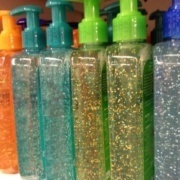What’s the deal with the Plastic Soup again?
March 15 2024 That’s what readers of news site nu.nl on their comment platform Nujij were wondering. In a recent […]
After holding a consultation round, the British Government recently announced a ban on microbeads in personal care products to take effect on 1 January 2018. The director of Britain’s Cosmetic, Toiletry & Perfumery Association (CTPA), Dr Chris Flower, responded to this announcement by stating that each ban should be based on scientific knowledge. In the case of microbeads it has been proven to be detrimental to the marine environment and the CTPA is happy that the ban is limited to scrubs. It claims that other plastic ingredients in personal care products do not contribute to marine pollution.
This means that even after the ban takes effect and products containing plastic microbeads are removed from the market, consumers will still see ‘polyethylene’ and countless other plastics on labels. The CTPA admits that this is confusing for consumers, but it states that polyethylene does not automatically mean that the product contains microbeads. It goes on to say that there is a difference between the hard plastic particles and other types of plastics in personal care products. These have very different qualities and “do not pose any dangers to the environment”. For example, these comprise liquids that allow products to be spread smoothly on the skin in so-called leave-on cosmetics such as foundation and sun cream. These, the CTPA states, are not relevant in the current debate about the effects of plastic microbeads on the environment. In further explanation about the issue, the CTPA website states “There is no evidence linking ingredients in leave-on cosmetic products to plastic litter in the marine environment”.
The Beat the Microbead coalition seriously doubts this statement. It asks the cosmetics industry, that justifiably places great importance on scientific substantiation, to prove that the plastics that do not fall under the ban, do indeed pose no threat to the environment and do not contribute to the plastic pollution of our waters. To date, there is no evidence of this and consumers simply have to believe the cosmetics industry. Or not.
The international Beat the Microbead coalition advocates for 100% plastic free personal care products. Consumers need complete clarity on this issue and should not be confused by the list of ingredients on labels. If microplastics are used, in whatever form, it must be proven beyond a doubt that they are not harmful to the environment.
Read more about this subject in our Microbeads & microplastics file.
March 15 2024 That’s what readers of news site nu.nl on their comment platform Nujij were wondering. In a recent […]
The first Impact Fair is Europe’s largest Impact Experience. An interactive ‘immersive’ experience of impactful examples.
The waste-export to countries outside of the EU has been restricted The Netherlands is against a carpet ban on shipping of plastic waste.
The waste-export to countries outside of the EU has been restricted The Netherlands is against a carpet ban on shipping of plastic waste.

 Ioniqa technology enables limitless PET recycling
Ioniqa technology enables limitless PET recycling